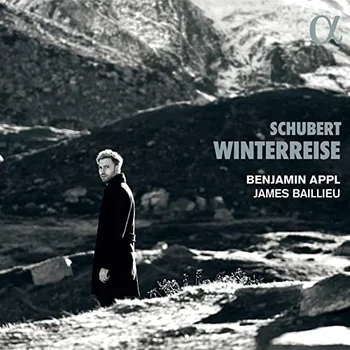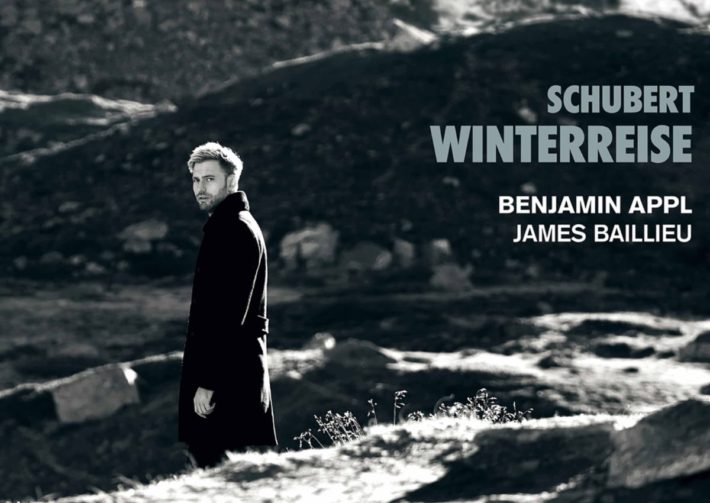Winterreise is what we could well consider a hallmark of the Romantic lied genre for its narrative quality and beautiful melodies. For Schubert, however, it was anything but. It was a series of ‘horrifying songs’ and in the emotional respect, this is perhaps true: poignancy, elation, loneliness, tragedy, enigma – all of these sentiments manifest so powerfully that we have no choice except to experience them alongside the protagonist. For all its sadness, baritone Benjamin Appl feels Winterreise represents something more: a quest for warmth and security.

In Gute Nacht (1), Appl doesn’t hesitate to tackle the complexity of sentiment; he is poetic, impassioned, and even weary. Despite this, the performance feels oddly confined. A large part of this might be due to the sound engineering, which makes the singer sound extremely up-close, more like what we’d hear on a pop or folk record. The lack of space for the voice to travel manifests in the way we mentally process the intensity of emotions being conveyed: with the music’s overarching gravitas, we need that breathing room. Another aspect lies in interpretation, as Appl sounds occasionally hesitant. Pianist James Bailleu, despite creating a beautiful mellow canvas on the whole, also makes some choices in articulation (3’40”) that don’t exactly fit.
Errstarung (4) is indeed lyrical but maybe not as effective as what Dietrich Fischer-Dieskau/Gerald Moore (1962) deliver. Appl goes for subtlety which, in the song’s context, translates again into hesitation. Diskau delivers phrases with more angularity and emphasis, thus underscoring the vivid urgency we want to hear. Bailleu’s opening is clean and well-articulated, but Moore’s is more persuasive with growling triplets and accented bursts in the left hand.
Die Poste (13), as is the most optimistic point of the journey, possesses a convincingly energetic buoyancy. Appl also brings added perspectives of hope and yearning in the key changes. Der Krähe (15) is by far one of his most riveting efforts of the set. The opening lines resemble a lullaby, but one that’s not meant for comfort; it is this sinister undertone that proves to be captivating. The climactic point at 1’21” might be expected, but the way he handles it makes for a terrifying moment–an effective embodiment of the horror Schubert had described.
The harmonically striking Der Wegweiser (20) shows just how masterfully Schubert visits an array of keys in such a short span, and the baritone‘s skillful adjustments in color and timbre let us appreciate this. Die Nebensonnen (23), for me, contains some of the most profound and complex music of the entire cycle: the piano’s calm choral textures and the expansive vocal lines contrast starkly to words that express deep despair. The irony is captured well in this performance, especially given the almost comforting warmth and resonance of the voice. Those looking for a slightly more contemplative take might refer to Gerald Finley/Julius Drake: Finley demonstrates excellent vocal control in maintaining the long phrases, while Drake’s piano introduction has a lovely arc to it.
The duo’s Der Leiermann (24) is a fitting conclusion to the cycle. In a perfect embodiment of solitude, the singer seems so deeply engaged in thought that he’s almost singing to himself. This is not at all a bad thing because it also beckons the listener to make a personal reflection on the journey. Bailleu’s contribution is an excellent left-hand ostinato–a realistic portrayal of the hurdy-gurdy’s drone. This enigmatic finale cannot help but invite a wide range of interpretations and comparisons. Appl’s shadowy and introverted account is vastly different from Peter Pears/Benjamin Britten’s which has more urgency and ache, or Thomas Quasthoff/Daniel Baremboim’s, whose narrative is nothing short of oracular.
The liner notes forgo conventional musical analysis; in their place is the singer’s own forward (along with, of course, the song texts). The intelligent writing makes the analysis ultimately unnecessary, as his refreshing insights on the cycle’s meaning helps to explain some of his artistic choices. This is definitely a musician who’s reflected carefully not only on the works themselves but also their larger impact long after the last note has sounded. It’s a real pity that the sound engineering hampered more than helped the performers’ musical efforts but that and a few misses aside, I enjoyed this Winterreise for its thoughtfulness and sincerity.
Recommended Comparisons
Fischer-Dieskau/Moore | Pears/Britten | Quasthoff/Barenboim | Finley/Drake
Schubert – Winterreise
Benjamin Appl – Baritone
James Baillieu – Piano
Alpha, CD 854



















